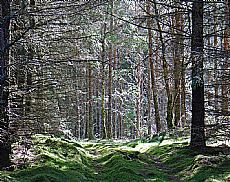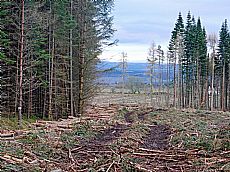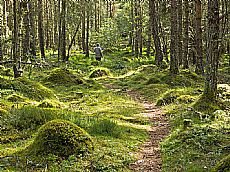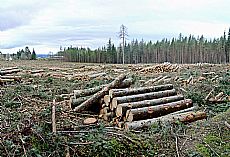The Black Isle
The two faces of forestry - landscape and industry
Julian Paren took these pictures before and after clear felling at Bellton Wood near Munlochy.
-------------------------
Black Isle Partnership and LP funding 2016
A proposal to apply for Landscape Partnership funding was considered by a working group of the Black Isle Partnership, with which TBI is closely associated, in 2016, but was abandoned because a suitable sponsor organisation could not be found.
February 2021
Landscape Partnership Ideas - TBI proposals
At the time, Transition Black Isle asked its members for their thoughts on possible projects to be included in a Black Isle Landscape Partnership bid. The following proposals were made and collated by then TBI convenor Martin Sherring. They are presented here unchanged (slight progress has been made with some), as we consider that they all remain worthwhile projects.
Cycle routes and paths
The Black Isle is already a great place for cycling and walking, but, particularly for cyclists on busy roads, safety is a major deterrent. There are some identified high-priority routes which would benefit from dedicated cycle routes – from Culbokie to Foulis (connecting to the National Cycle Network route 1 between Dingwall and Tain), the section of the A9 from the Tore roundabout north to the road to Killen, the Avoch – Munlochy route, ideally with an extension to Drumderfit. Some existing off-road routes have serious drainage problems which make them impassable in most conditions. There may also be scope for a bigger proposal of a “Black Isle Way” or similar, possibly linking with existing off-road routes.
In 2014 Transition Black Isle commissioned a feasibility study on the Avoch – Munlochy route which highlighted opposition from one landowner as a problem, but we still believe this route is important, and further discussions would be worthwhile. There are a few other sections of disused railway which could conceivably be upgraded (Muir of Ord – Tore). We understand there used to be a coastal footpath between N Kessock and Cromarty, much of which was suitable for cyclists. We have produced route cards highlighting off-road routes between most of the Black Isle villages, but many of these routes are unusable by cyclists in wet weather. We have not done any work on the Tore – Killen Road, or the Culbokie – Foulis routes, but we believe that these should be considered, and we think it likely other residents will be able to suggest further possibilities for routes which give safer cycling options, and also offer new walking routes.
Public transport improvements
Although most Black Isle roads are quiet, there are places where congestion is an issue (e.g. Rosemarkie and Fortrose centres) and where fast traffic is a safety concern (e.g. Cullicudden). There are plans for significant numbers of new houses on the Black Isle, which are likely to make traffic problems worse. In order to minimise this, in addition to our proposals for cycle routes, we would like to see an improvement in public transport provision. In particular, the northern and central parts of the Black Isle are poorly served by public transport, and the morning service arrives too early or too late for commuters wishing to be at work for 9am (services arrive in Inverness at 0759, 0825 or 0930) and take 50 minutes for a journey which takes almost half this time by car. Commuting to Dingwall from the south side of the Black Isle is impossible without a lengthy detour to Inverness. A dial-a-bus or community car scheme which transports passengers to public transport stops could be a viable project, and a pilot scheme has been running in the Ferintosh Community Council area.
Community Woodland Centre
We have a number of proposals for greater community use of woods:
Woodland classrooms – we are aware that Evanton Community Wood recently won an award for their education activities, and that there is some interest in similar activities on the Black Isle
We would also like to be able to offer extra-curricular training in crafts such as coppicing, fencing, dry stane dyking, etc
We would like to explore other opportunities to give communities the capacity to manage local woods for their own social and commercial benefit.
Village landscaping
Demand for “low maintenance” gardens has led to an increase in the use of hard landscaping in Black Isle Villages, with fences and walls replacing hedges, and paving and lawns replacing more varied plantings, with disadvantages for wildlife, visual amenity and carbon emissions, and also increased use of non-renewable resources. We would be interested in finding ways to reverse this trend by developing training materials to demonstrate alternative low-maintenance techniques which retain or enhance bio-diversity.
Wildlife Trail
We are aware of the work initiated by Avoch & Killen Community Council and Black Isle Tourism Team, looking at the feasibility of a Wildlife Trail on the Black Isle. We consider there is scope for improved interpretation of sites of interest both to tourists and local residents. This could cover wildlife and historical sites. We suggest it could take the form of an app, allowing easy maintenance and flexibility.
Wildlife and ecology more generally
Looking at the wider landscape, we consider there are a number of topics which could usefully addressed, to improve ecological diversity:
Following up on the work which was done several years ago by Phil James on habitat connectivity
Extending the work by the Fisheries Trust on tackling invasive non-native species especially mink and Himalayan balsam (and also giant hogweed)
Habitat management for farmland species such as grey partridge and brown hare
Improving the general sustainability of current farming systems in the Black Isle, in terms of soil conservation, energy usage, food miles.
In this context we also think it would be worthwhile to encourage land-users to consider the future impact of climate change, including more frequent severe weather events and changes in the range of plants and animals. Examples of changes which could have a profound impact are increasing incidence of potato blight, more frequent and serious wind damage, flooding, and soil erosion becoming an even more serious issue.
Seasonal food festival
In other places people identify strongly with a particular local food. In the Highlands the best example is possibly the humble potato – Transition Black Isle sells around 15,000 seed potatoes at its annual potato day. However, much of the local agricultural produce (barley, oil-seed rape) has no local identity.
Could we organise an annual festival, associated with a local, seasonal food, tightening the links between local residents, the landscape, and the growers? Transition Black Isle already has an apple press which is made available at the community markets in October/ November, and we are about to carry out a survey of local orchards as part of the National Orchard Inventory for Scotland; could this activity be developed into an apple month, with apple tastings, restaurants and cafes featuring local apples and maybe some unusual varieties, apple stalls at the community markets, orchard tours, etc.? We have found a considerable demand for training in pruning fruit trees, so maybe we could train a team of volunteer “orchard masters” to advise on maintaining existing trees, and on establishing new ones.
A possible alternative would be strawberries – or anything where the local, seasonal product is much better than what’s available out-of-season from the supermarkets. Apples and soft fruit both have the advantage that with global warming, they are likely to become easier to grow here. The benefit would be that it would encourage more local growers, maybe help maintain some heritage varieties, and build pride in local produce, which could then be extended to other local food.
Food Hub
Developing the theme of encouraging local food production, the existing community markets offer outlets for the occasional purchase of local food, but they don’t yet make it possible for people to buy (for example) all their vegetables from local growers. A possible way to do this would be to establish a local food hub, acting as a retailer, taking orders for local produce, distributing the orders to suppliers, taking delivery from them and parcelling up the orders. There are already models for this sort of development, including some in the Highlands, and there is open-source administrative software available, see www.stroudco.org.uk/how-it-works/. Funding would be needed for an initial feasibility study, then a trial phase.
Martin Sherring, TBI Convenor.
-------------------------
Latest News...
Forthcoming Events…
- Tuesday 30 April
- 19:00 Talk - The Birds and the Bees of Lily Loch
- Wednesday 1 May
- 19:30 TBI Admin (Trustees) meeting 7.30
- Saturday 4 May
- 13:00 Black Isle Repair Cafe at Muir of Ord
- Thursday 9 May
- 18:00 Join in with the Zero Waste Food Challenge: Workshop 2 - Shopping
- Friday 10 May
- 13:00 Uunveiling of the Coronation Tree and Plaque for Ross and Cromarty
- Saturday 11 May
- NA Cromarty Community Market
- Saturday 18 May
- NA BIHS Spring Plant Sale
- NA Culbokie Community Market
Events to add to calendar? Contact Us.
TBI Business Directory
Add Your Business
Do you run a sustainable business on or near the Black Isle? Add it to the TBI business directory
Browse Directory
- Accommodation (3)
- Crafts (10)
- Health and fitness (8)
- Home improvements (17)
- Local food suppliers (18)
- Miscellaneous (35)
- Renewable energy (17)






